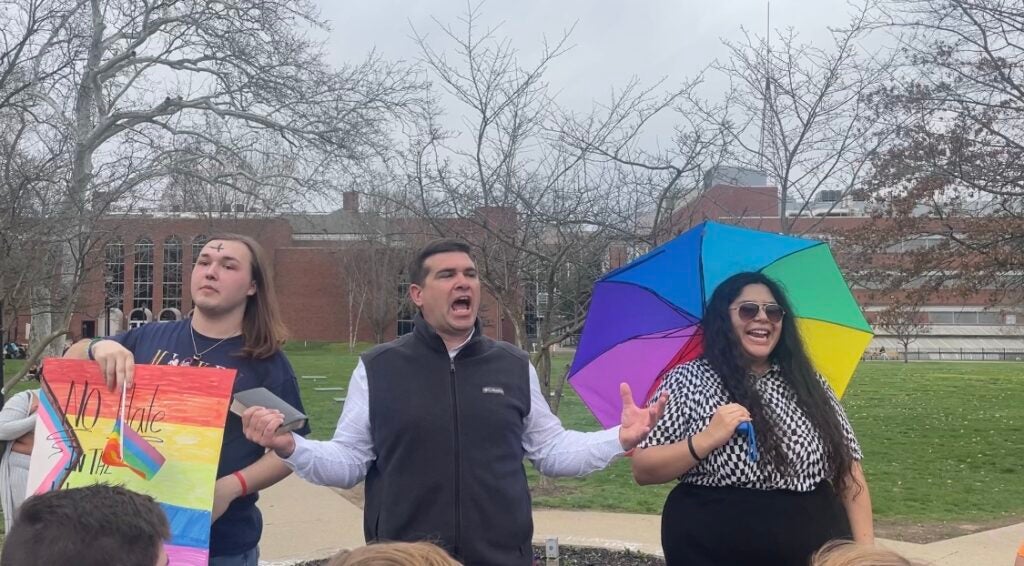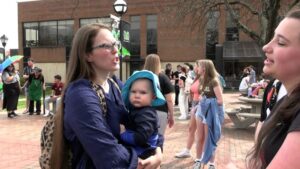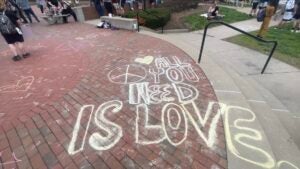
Luke Hamilton
Friday, March 15, 2024
A controversial preacher brought together students from the LGBTQ community, religious backgrounds and across campus as they protested his message on Thursday, March 14, near Buskirk Field.
Springtime in Huntington, West Virginia, already brings more students outside, but a protest of this magnitude has not happened since an anti-abortion group came to campus in April of last year.
The man preaching from the top of a flower bed went by the name Brother Ray. His wife joined him, watching from a distance while holding her baby and debating with students.
Ray and his wife declined to give their last name. The preacher’s wife did provide her first name, but never confirmed the spelling. This caused more confusion when she referred to herself as Sister Ray.

“He read Leviticus 18:22, which is like, the most standard anti-LGBTQ+ verse in the Bible and yelled about transsexuals going to hell and whores going to hell,” said Sam Green, a student at the protest.
Green is a member of the Marshall University Appalachian Liberation Collective, a student organization which advocates for the liberation of marginalized communities.
After grabbing the attention of spectators early on, he said the preacher calmed down while remaining antagonistic.
“I had a friend message me that he was talking about LGBTQ+ people reading off hateful Bible verses and not reading them correctly,” Green said.
Other students found out about the preacher from popular social media platforms such as YikYak and Snapchat.
Meanwhile, Ray said he felt like God sent him to Marshall two days before spring break because a student could die and miss out on everlasting life.
“People are hostile to the truth. It’s a generation that’s been deceived,” Ray said. “They’ve been deceived to think that good is evil and evil is good.”
He said he expected the backlash, and he continued to spread his message among the protesters for hours.
Protesters and campus organizations created signs and chalk drawings to display resistance to Ray. The majority of the artwork included pro-LGBTQ messages and emphasized their opposition to Ray’s comments.
One of the artists, a student named Jewel Robinson, said the majority of her friends are part of the LGBTQ community. The rhetoric used by Ray motivated Robinson to draw a message with chalk that said, “All you need is love.”

“It’s fine, but not when you’re spreading hate speech about my friends,” she said about Ray’s presence on campus.
“He’s bringing the community together but for the wrong reasons,” said Sophia Smart, another student at the protest.
Smart said Ray would probably go home if the protesters stopped giving him attention.
Students involved in the religious community on campus also disagreed with Ray’s message.
“Don’t use this as your example for Christianity,” said James Sneddon, a student who practices evangelism on campus. “God’s kindness leads us to repentance.”
He said Ray forgot to show that kindness is necessary to cause spiritual change.
Although many of the protesters stressed the importance of love, Sneddon also said, “This is not love. It’s one side yelling at another side. They’re screaming obscene things.”
Aside from art, others protested by audibly mocking Ray.
“The crowd told this guy that his wife was gonna leave him for a high schooler,” Sneddon said.
Smart said Ray’s abstinence was the reason for his anger towards the protesters.
In addition to verbal and artistic protests, some protestors drew upside down crosses on their faces, and one student twerked on the flower bed to distract the preacher.
“I’m always open to trying different ways,” Ray’s wife said after multiple students had questioned her husband’s methods.
Students said Ray was polite in comparison to her husband, but she continued to defend his message.
“I think he’s trying to provoke people to thought of what happens after you die,” she said.
Other students said Ray’s message caused more problems than it solved.
“It’s frankly ridiculous, and I don’t think that it has any place at a college campus, especially how diverse Marshall is,” said Aliyah Quinet, another student.
Quinet summarized the preacher’s message by saying, “Oh, you’re going to hell just because you like to kiss men or women.”
Jenisis Carter, another student, said there are loving Christians out there, but Ray’s word choice was an example of why people turn away from religion.
“At the end of the day, he’s not doing anything,” Carter said. “It’s embarrassing for him and his religion.”
Green said Ray could have better results if he were more approachable.
“I think, instead of a guy just screaming, he could have a kinder, more gentle conversation,” he said.